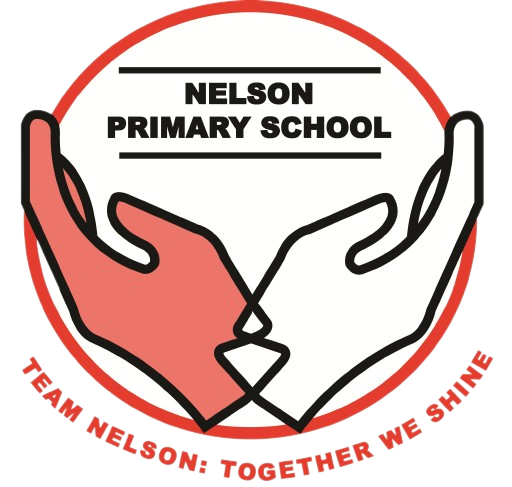Progression of Skills
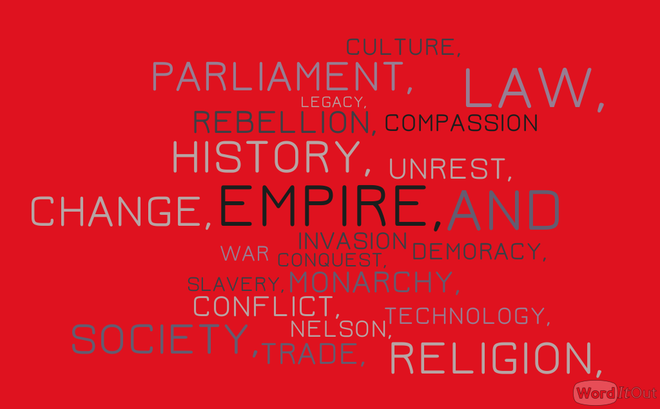 To ensure that our Key Stage 1 & 2 history curriculum is successful in developing children's historical understanding, we need to take a progressive approach. This means that we cannot simply repeat the same types of work year after year. Instead, we have planned a curriculum that becomes increasingly challenging as students move through school. We have also prioritised teaching the units in chronological order. This is because:
To ensure that our Key Stage 1 & 2 history curriculum is successful in developing children's historical understanding, we need to take a progressive approach. This means that we cannot simply repeat the same types of work year after year. Instead, we have planned a curriculum that becomes increasingly challenging as students move through school. We have also prioritised teaching the units in chronological order. This is because:
-
Learning history chronologically helps students understand the context and causality of events. They can see how one event led to another, helping them make sense of the past and its impact on the present.
-
Critical Thinking Skills: Chronological teaching encourages critical thinking skills as students analyse the reasons for changes over time and the consequences of historical decisions. This promotes a deeper understanding of history and the ability to draw informed conclusions.
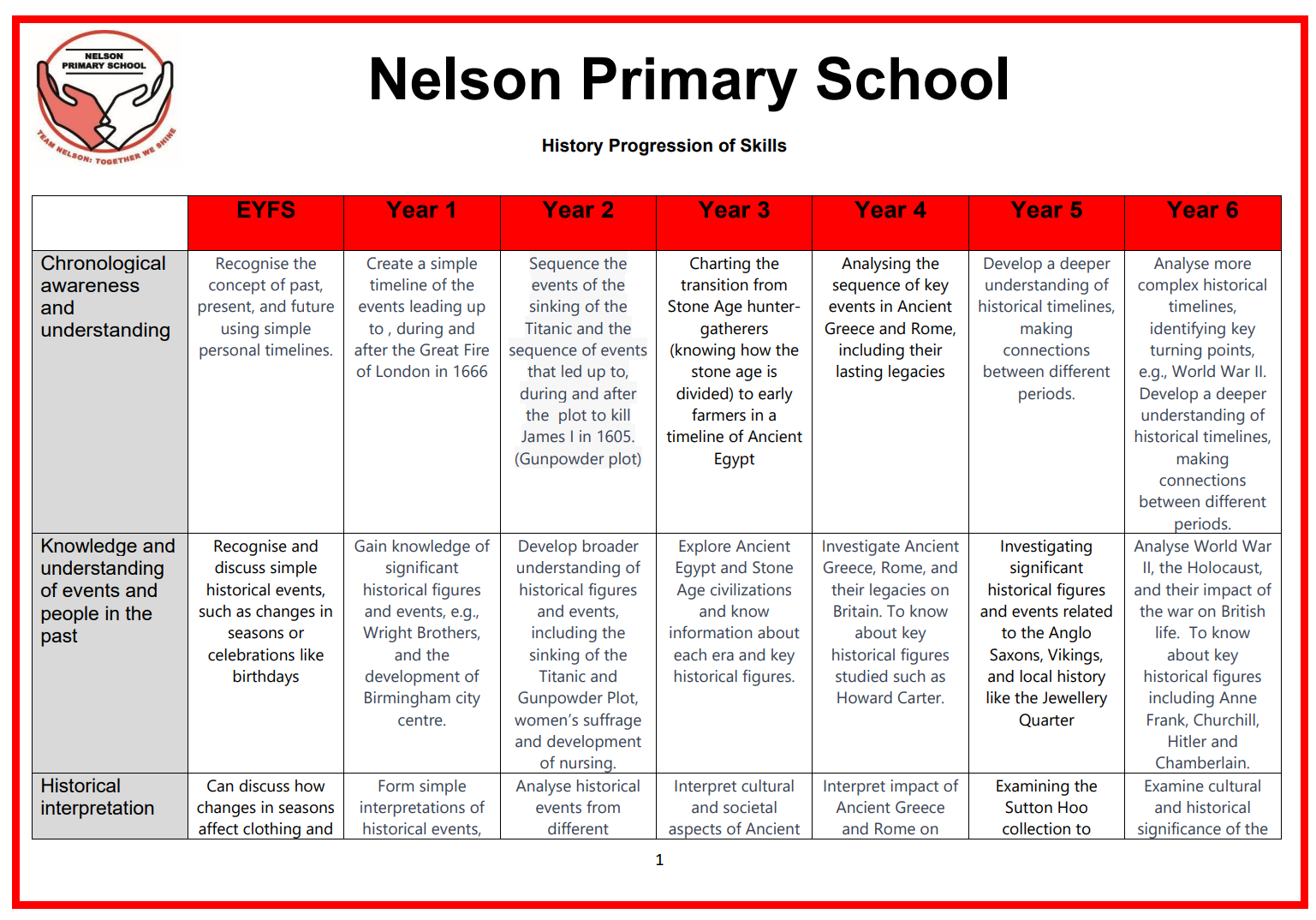
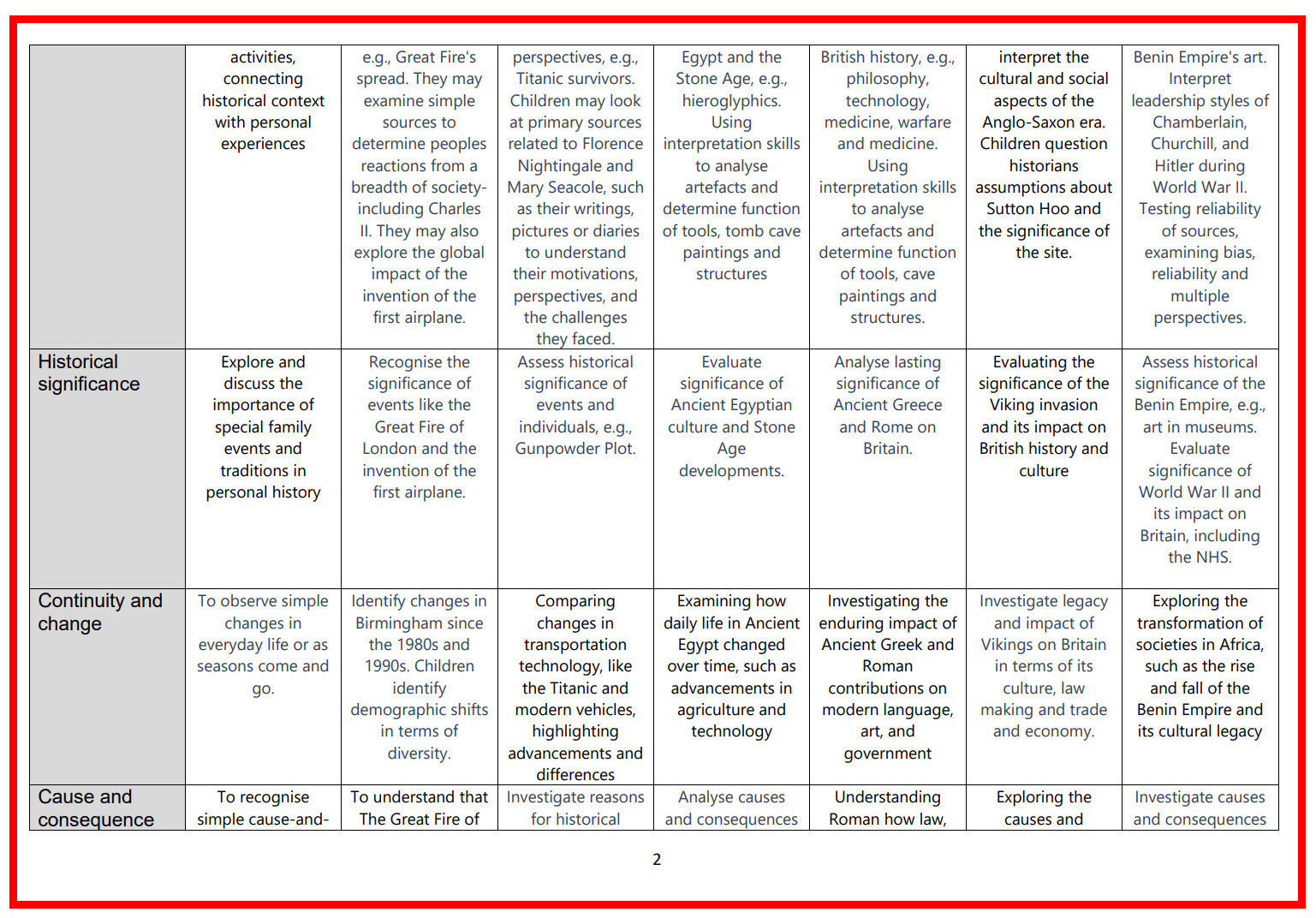
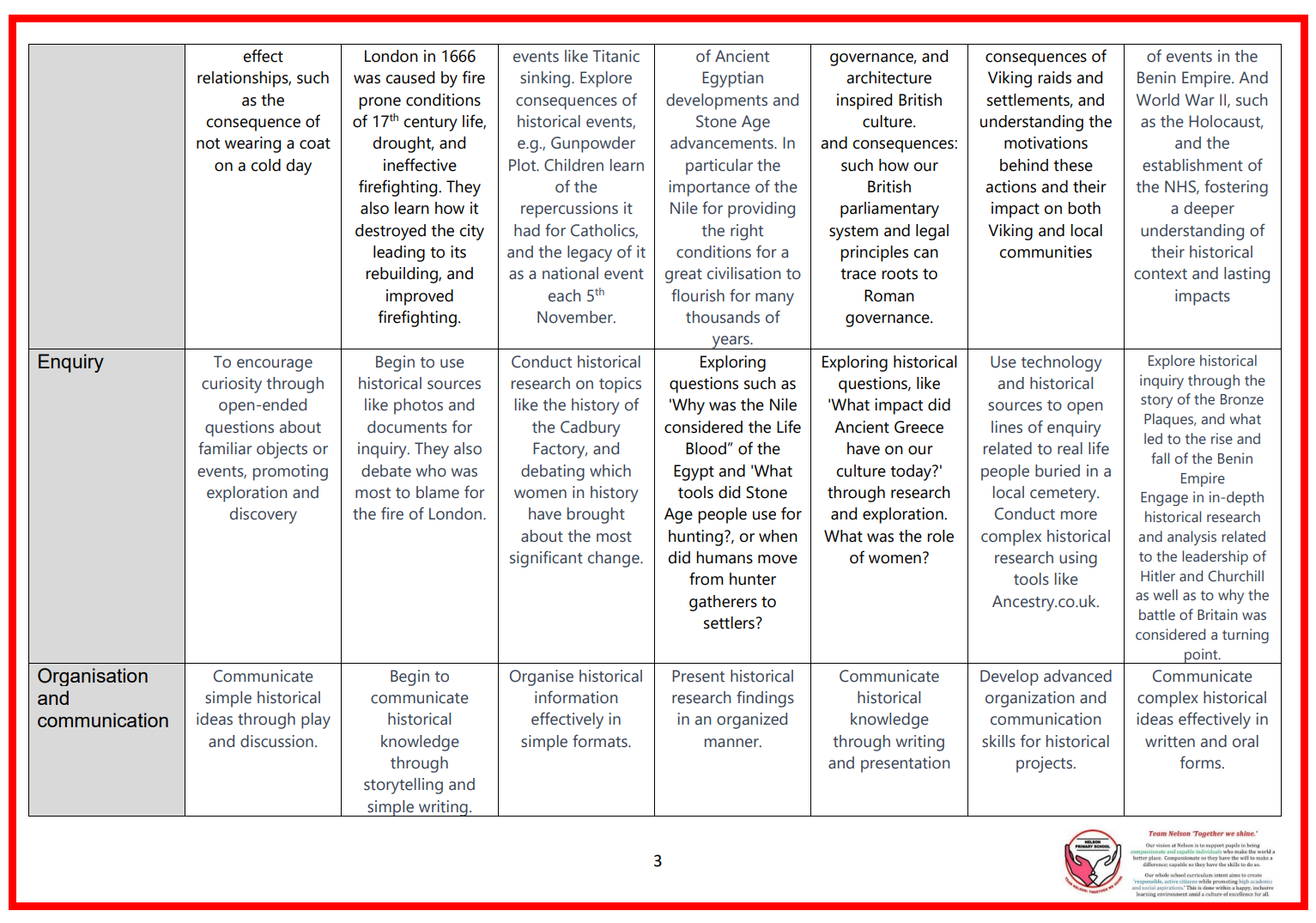
End Point Pupil Statements
At the end of Year 1, I can do a lot of cool things as a little historian! I know all about changes in Birmingham from my grandparents' time, like how buildings, toys, and even phones were different in the 1980s and 1990s. I can talk about my experiences and compare them to the past, just like a history detective! I love looking at old pictures and hearing stories from my family, and I even know how to show time in timelines. Oh, and did you know I can tell you about the Wright Brothers and their awesome invention of the first aeroplane? I understand how inventions can change the world and why it's important to remember cool people from history!
In Year 2, I became a super historian! I dived (literally) into the sinking of the Titanic, mastering skills like sequencing events, understanding factors causing the tragedy, and explaining its long-term impact on safety. I can empathise with the class dynamics and historical figures, using cool historical vocabulary. Plus, I created a touching Titanic memorial and engaged in ethical thinking and historical analysis.
Also, because I learnt about the Gunpowder Plot! I can now piece together events, ask questions about primary sources, and ponder interpretations of Guy Fawkes. I know all about key plot events, its purpose, and its representation today. Using artefacts,
Also, because I learnt about "Women who made a difference." I know all about the lives of Florence Nightingale, Mary Seacole, and the Suffragettes. I use primary and secondary sources, answer tricky questions, and justify memorials. I am better now at understanding long-term changes and using the past to make today even better!
In Year 3, I became an ancient history explorer. This year I journeyed through the Stone Age to the Bronze Age, and I can now understand the order of events during the Stone Age, critically evaluate sources' reliability, and comprehend the causes and consequences of significant events. I've mastered sequencing periods, describing distinct features of different eras, and explaining the impact of major changes during the New Stone Age and Iron Age. Plus, I've learnt how we uncover secrets from thousands of years ago through archaeology.
I also embarked on the mysteries of Ancient Egypt! I've honed my historical enquiry skills, answering enquiry questions about the Nile's importance, critically thinking and problem-solving on historical scenarios connected to the opening of the tomb of Tutankhamun , and collaborating with my peers. I've also learnt to make ethical considerations, respecting the artefacts from tombs. Now, I can analyse historical sources, enhance critical thinking, and understand the cultural sensitivity of handling ancient artefacts.
At the end of Year 4, I'd become a better history explorer, uncovering the mysteries of the Ancient Greeks! I've learnt to consider
different interpretations of history, discussing the role of women, understanding Ancient Greece's changes and developments, confidently writing about Greek culture's modern influence, and recalling causes and consequences of important events like the Battle of Marathon. I can evaluate the significance of figures, events, and ideas in Ancient Greek history, understanding their lasting impact. Now, I can compare Ancient Greece to other civilisations, explore daily lives, analyse primary sources, and study battles, deepening my understanding of this fascinating era.
Also, as a result of my lessons about the Romans and their impact on Britain! I've honed my skills in comparing eras, increasing subject knowledge about Roman influence on daily life, recalling key figures, and understanding reasons for the Romans' departure. I've discovered the Romans' arrival and departure dates, their efficient administration system, the construction of cities and roads, and their lasting influence on British culture. I'm more confident to talk about the Ancient Greeks' and Romans' contributions and legacies!
In Year 5, my historical journey deepened as I learnt about the Anglo-Saxons as invaders. I explored the Roman Empire's collapse, the Saxons' invasion, and daily life, honing skills in analysing historical events, settlement factors, and critical thinking. During a local History Study I can also consider the significance of the Jewellery Quarter, and have enhanced my fieldwork and digital research skills, including handing out data that focused on changes in the Jewellery Quarter, and I can now present my findings in the form of reports. I also know how to navigate ancestry.com to find historical records of people that lived a long time ago in my local area. I also immersed myself in Viking history, refining my skills in using historical sources, distinguishing fact from fiction, and forming opinions based on evidence. In particular, I can talk confidently about why the Vikings invaded, when they invaded, as well as the legacy of people such as Alfred th Great and other Anglo-Saxon kings. My disciplinary skills mean I can conduct historical analysis, source evaluation, and engage in critical thinking, making me proficient in uncovering historical narratives, interpreting changes, and appreciating diverse contributions to society.
At the end of my primary history education in year 6, I can tell you about the impact of WW2 on Britain, improved on my chronological reasoning, deftly plotting events on a timeline leading to the 20th century. I can analyse more complex historical sources, particularly Anne Frank's diary. I enhanced my interpretation skills, and navigated diverse perspectives and recognised reasons for bias. I can also investigate social aspects of history such as daily life during the war. I honed my research skills, and can compare leadership styles from the 20TH century. I can explain what the long-term consequences of the wars were, including the establishment of the NHS and the shaping of multiculturalism.
I can also talk about the Benin Kingdom (1440-1997), and use chronological reasoning to place Benin on a timeline in relation to other historical studies. I can question the validity of sources, extract useful evidence to answer questions, and demonstrate comparisons between European and African civilisations. I can engage in ethical and moral discussions more maturely (such as the return of artefacts like the Benin Bronzes) , as well as explore the historical impact on trade and relationships. I can assess historical significance and make informed judgements. This enriched journey equipped me with a deep understanding of the importance of studying Benin, adept analysis of historical sources, critical evaluation of historical effects, and active engagement in moral debates, particularly regarding the return of artefacts like the Benin Bronzes.
